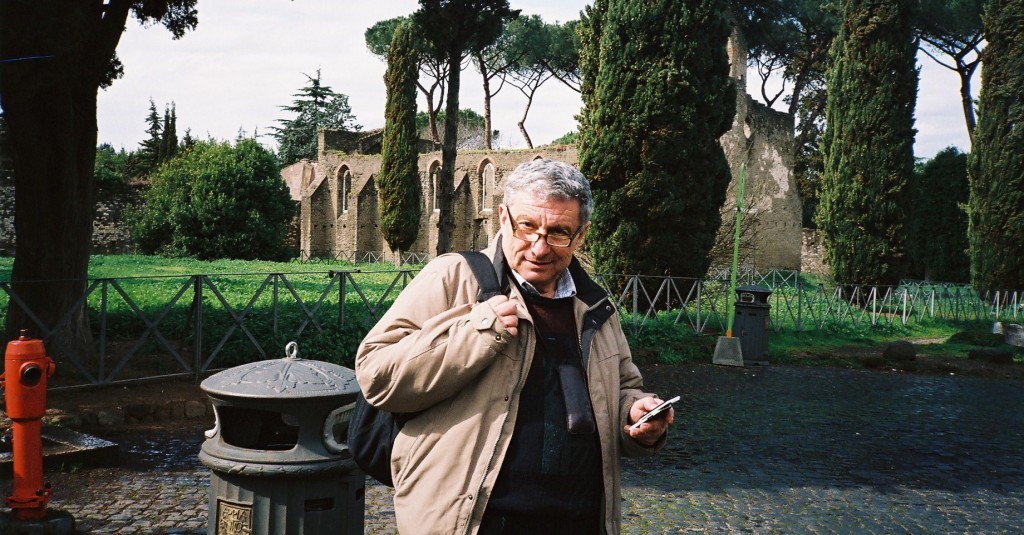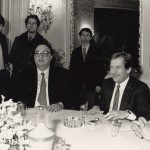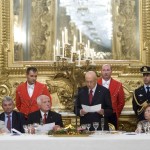We meet with Josef Kašpar, dean of foreign correspondents in Rome
“It was the spring of 1970, a delightful Roman Spring. A dry letter arrived, written on greyish paper, a few concise lines. It stated that “… the Czechoslovakian people have already spent enough on their studies abroad” and they invited me to return immediately to Prague. They were the first effects of the “normalization” imposed by the Russians… I was informed, I suspected. I understood that there was something else behind that letter, I was certain that they would have punished me, once back at home, for my “bourgeois deviation”, for my Italian stays judged to be suspicious, so I decided, though with some fear, just to stay in Rome”.
He seems amused, Josef Kašpar, to tell this 50 year-old anecdote. A seemingly marginal newsflash, but it explains part of his experience as a “historic” journalist, today we would say a dean of foreign correspondents in Italy. Half a century on the Tiber, in ‘76, even the Roman passport arrived. Thus Kašpar is undoubtedly a great journalist, writer and translator, but he is also something else. He could be defined, (it does not sound like a weird definition) as a “mediator” between Rome and Prague, in the sense that through newspapers, television, essays, and interviews he explains the Italian mentality to Czechs and the Czech mentality to Italians.
“Take the case of the recent arrivals of illegal immigrants on the Sicilian coast and elsewhere for example”, Kašpar clarifies. “In the Prague headlines apocalyptic news appeared: even our tourists were advised not to attend the cities and beaches of the peninsula. I tried to explain on “Česká Televize”, the national TV channel, the truth of the facts: come and don’t worry, there’s no danger. I say this because, even today, misinterpretation is easy, and there is always someone who adds fuel to the flames”.
 - So, basically Czechs do not understand the Italian reality?
- So, basically Czechs do not understand the Italian reality?
“Not exactly. I would say that they interpret it in their own way. Then, of course, there are the cliches about Italian loafers, the Kafkaesque bureaucracy that reigns in Rome, and so on. But I think today, especially among the younger generations, the admiration for Italian style prevails. That is not just the elegance of owning a custom-built Ferrari or a Valentino dress. No, it is the admiration for the Italian way of approaching life, knowing how to live, not to mention the good name of the Italian industry”.
- Admiration for Italy. Yet, the Czechs are considered very close to the so-called “hard-line”, the one followed by the Germans towards Mediterranean countries…
“First of all, we are a country of the Union, but we are not (or are not yet) a Eurozone country. So the German positions affect us from a political point of view, certainly. A little less, I believe, from a monetary point of view. The acceptance in to the Union of Prague was far less sentimental than what may be believed in the west. Joining a united Europe was seen as an opportunity, a chance to improve the structural level of the country. Then, gradually, the Czechs also realized that it was a limited opportunity. It was necessary to reckon with the Eurocrats of Brussels, regulations, milk quotas, directives and so forth. A sort of “democratic disillusion” followed… it was understood that it was a “condominium” still guided by the greats of the Continent…”.
- And therefore?
“And therefore, we might as well believe in the Union, but with prudence, and without too much enthusiasm…”.
- However, regarding the integration of refugees from Africa or the Middle East in our country, even the Czech left appears to be very restrictive. The positions seem almost “xenophobic”. Are old ghosts reappearing?
“The media, not just in Prague, created a psychosis about refugees. In particular those of Arab descent. A proclaimed drama that does not really exist: the boat people get confused with Islamic terrorists, desperate job seekers with potential killers. The fear of others is combined with the historical insecurity”.
- Will we return to the Europe of the people against the bureaucrats?
“We avoid the banality, but there is a grain of truth even in the slogans. Personally, I consider myself a “European social-democrat”, and I still don’t believe that the entire German population share the positions of Angela Merkel and Wolfgang Schäuble. The Germans have a sense of supremacy, not of cultural hegemony. It is a subtle but important distinction, however, Americans have understood very well”.
- Meaning?
“I mean that everyone appreciates the German cars, the strength of their democracy, their organizational skills, but the Germans can never emanate that cultural attraction that Americans have exercised through their music, Hollywood films, and the casual dress and many other things of which had been saturated in our lives, at least since 1945. There is another phenomenon that bothers me – the return of clichés and prejudices. It is one thing to criticize Merkel, and another to blame the German people. And the same goes for the Greeks, for Italians and for all others. As if someone had forgotten the errors and horrors of the past”.
- Half a century in Italy. The question arises naturally: will we make it?
“Italy has always given the best of itself in difficult situations. It is a wounded country, but I think we will overcome this devastating economic and social crisis. There is a price to pay, it’s clear. In 2014, half a million Italians left the Peninsula. It is not emigration of labourers, but qualified people, graduates, specialized technicians, all going away in search of work”.
- Is the Peninsula becoming the fringes of the German Empire?
(He laughs ..) “I see a danger. There certainly now is German hegemony, that not only the Italians are paying. But the greatest danger I see more is in the fastly diverging growth of the two Italys, in the increasingly wide gap between North and South. There is a gulf between an inhabitant of Trento and, say, one of Caserta. An abyss in services, the efficiency of the state, in the cultural level. This data is also perceived by simply staying in Rome for a week”.
- We haven’t spoken of Russia… or maybe we should still say USSR?
“I do not feel fond of Putin or his way of ruling, but I think it has been unnecessary and counterproductive to humiliate Russia over the past few decades as some American circles have done. And also let’s not forget the past. After the collapse of communist in ‘89, Soviet troops left without firing a shot the GDR, Czechoslovakia, Poland, and Hungary. And look at what happened in the places they were not present, namely Romania and Yugoslavia, where the events were very dramatic. I think this page of history must not be forgotten”.
by Ernesto Massimetti







